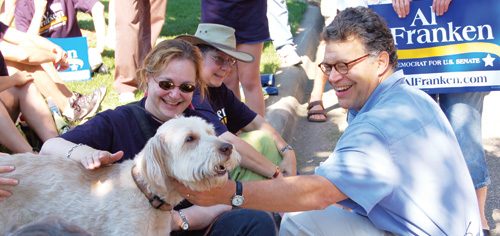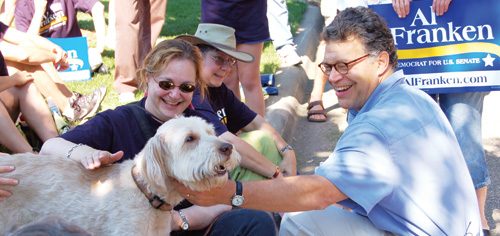

The Senator and the Service Dog
How a politician, an Iraq vet, and a very special dog named Tuesday are changing politics, one companion at a time.
“Any time you run a political campaign you have good days and you have bad days,” says Minnesota’s Democratic Senator Al Franken. He should know—the former comedian, radio personality, and writer for Saturday Night Live fought a long, hard fight against Republican incumbent Norm Coleman, including a series of statewide recounts (which ultimately found Franken ahead by 225 votes) and a Supreme Court battle. He finally emerged victorious and was sworn in this July—eight months after the votes were first cast.
But when Senator Franken talks of good days and bad days on the campaign trail, he speaks in this case of losing a dear friend. “Without question,” Franken recalls, “The worst day of our campaign was the day about two years ago when we had to put down our black Lab, Kirby.” Along with the Franken family, Kirby had made the journey from a small apartment in New York City back to Al’s home state when he commenced his bid for Senate. Kirby had cancer, and it had metastasized throughout his body. To lose their old pal at such an important juncture had a profound effect on the then would-be Senator. “Like almost every Lab I know, he was the sweetest, gentlest guy,” Franken says. “A heart on four legs.”
Franken’s background, politically speaking, is very different from most of his colleagues in the Senate. While he is a sharp political mind, and has written brilliant and biting books on the subject (recommended: Lies and the Lying Liars Who Tell Them: A Fair and Balanced Look at the Right), he did not enter politics in a traditional manner, and in fact spent his youth writing brilliant and biting comedy, mostly on Saturday Night Live. This fact rarely escaped his opponent—during the campaign, Coleman’s team dug up several pieces of Franken’s satire, one of which was published in Playboy magazine, and held these up as reasons not to elect.
There was one facet of Franken, however, that Coleman’s team could never skewer: his commitment to America’s military. As a comedian, Franken had been a vocal and fervent supporter of the troops. He also went on several USO tours, and during these met and befriended many soldiers. Since 1999, Franken has toured to Germany, Italy, Kosovo and Bosnia, and to Iraq and Afghanistan four times. “The trips are always tremendous fun,” Franken says, “but [they are] also very moving and sometimes wrenching.” In addition to these, he also visited wounded soldiers in Iraq and at the Walter Reed and Bethesda recovery facilities.
There’s an old saying: “Luck is when preparation meets opportunity.” It would be an opportune meeting marrying his USO skills and love of dogs that would come to make up Senator Franken’s lucky first moments in office. This past January, months before he was finally sworn in, still-just-Al Franken would visit Washington, DC for President Obama’s Inauguration. At an official event, he met an Iraq war vet. That veteran, Captain Luis Montalvan, had an interesting plus-one guest: his service dog, Tuesday. Like Kirby (and many other service dogs), Tuesday was a Lab. Franken struck up a conversation with Montalvan.
“Candidate Franken was very attentive,” recalls Montalvan. For his part, the two-tour veteran spoke passionately about Tuesday, and the benefits of bringing service dogs and veterans together. People tend to think of service dogs as strictly guide dogs—leading the blind and hard of hearing safely around the world. But Captain Montalvan made it clear that Tuesday, who had been provided to him by a non-profit organization, was much more than that. Before Tuesday, Captain Montalvan had struggled with pain and brain injury, and with the effects of post-traumatic disorder. As an intelligence officer, he’d been singled out for assassination, was badly beaten, and stabbed. When he first returned home, he was so traumatized by his experience that he had developed agoraphobia and could not leave his house.
Tuesday, he says, makes all the difference. She helps him physically, by picking up objects, reminding him to take his pills (and ensuring they get taken) and by navigating and aiding him around the house and out of doors. But more keenly, Tuesday is a great psychological aid: she wakes him from nightmares, helps calm insomnia and eases panic attacks by sensing changes in Montalvan’s breathing. Put more succinctly by Captain Montalvan himself, “Tuesday is a happy being that is with me all the time.”
Senator Franken was moved by Montalvan’s story, but the nature of politics is that a conversation at an event where press and colleagues are present doesn’t necessarily mean there will be action. So when Franken called Captain Montalvan at home a
week later, the veteran was shocked. “When this famous person is calling, you think that something might happen.”
And something did. Still unconfirmed as Senator, Franken met with Hearing and Service Dogs of Minnesota. Facility founder Al Peters and his staff educated Franken on the costs, training and veterinary care associated with service dogs. With their help and resources, Franken was able to begin thinking about legislation. When he was sworn in this summer, he wasted little time. The Franken-Isakson Service Dogs for Veterans Act was passed by the Senate in July. Notably, the act was co-sponsored by Senator Johnny Isakson (R-G.A.), making it a rare aisle-crossing bill. (Isakson’s ailing mother had a companion
animal.) The bill’s passing signifies further steps towards a pilot program that would make service dogs like Tuesday available to veterans like Montalvan. “The Deptartment of Veteran’s Affairs does not do enough,” Montalvan says. “This is one important step.” Further down the line, Montalvan would like to see more education on service dogs and the Americans with Disabilities act, so that he and Tuesday get treated like equals no matter where they go. In the meantime, Montalvan pledges to remain a voice for the rights of veterans and their service dogs. “It’s been such an amazing change between [before Tuesday] and now, it’s almost a duty to tell people about it.”
For his part, Senator Franken looks upon his success with the act as the beginning
of a long, hard-earned career working
for the people of Minnesota. “Next is health care,” the Senator says. “We have to reform our system, and I know we will. My solution: more dogs.”
Join the newsletter and never miss out on dog content again!
"*" indicates required fields
By clicking the arrow, you agree to our web Terms of Use and Privacy & Cookie Policy. Easy unsubscribe links are provided in every email.